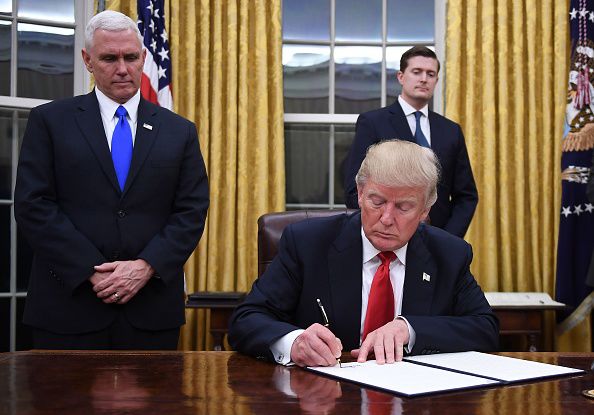Mass: Congress alone should control tariffs

US President Donald Trump signs an executive order as Vice President Mike Pence looks on at the White House in Washington, DC on January 20, 2017.
June 13, 2018
On June 8, President Donald Trump traveled north to Canada to attend the annual Group of Seven summit. At the summit, representatives of the world’s seven largest economies met to discuss trade policies and how they can spur global economic growth while protecting the world’s resources. This year, things were a little chilly for the U.S.
Tensions have been strained between the U.S. and other major world economies over recent weeks as President Trump’s administration sought to impose tariffs on imported steel and aluminium. These metals are both cheaper for American businesses to buy in foreign markets and ship to the U.S. than to manufacture or purchase here.
The motivation for the Trump administration is simple — protecting American jobs in the steel and aluminum industries. If the government makes foreign products more expensive, it follows that more companies will buy domestically, thereby increasing demand and creating jobs in these industries.
However, there are multiple issues with this rationale. The use of manufacturing robots have already replaced and will continue to replace even more American manufacturing jobs. In addition, placing tariffs on other countries’ goods leads them to retaliate by placing their own tariffs on our goods, leading to what is often known as a trade war.
Indeed, the European Union has already placed a tariff on Kentucky bourbon to send a message to Senate Majority Leader Mitch McConnell, who represents Kentucky. Canada has placed tariffs on American steel and aluminum.
The most worrisome retaliation, though, is against American farmers. Mexico has already stated it will impose tariffs on American farm products. Even more disturbing is the fact that China has also issued tariffs on American farm goods like pork. Farmers are often the first to be targeted in trade wars and nearly always bear the brunt of such international disputes.
Why does that matter to the average Iowa State student? When Iowa farmers do well, they spend money. In fact, nearly half of Iowa’s economy is impacted by agricultural industries according to Iowa State economist Alejandro Plastina.
And when farmers spend money, the state of Iowa collects a part of it in taxes. So when tariffs like these hurt farmers, Iowa’s economy slows. The state then collects less in taxes, and our university likely gets more budget cuts, just like the ones we faced last year.
This raises the all-important question: why can the president unilaterally choose to impose tariffs on other countries? Well, it hasn’t always been this way. The Constitution clearly laid out in Article I, Section 8 that Congress had the power to “regulate Commerce with foreign Nations.”
Over time, though, Congress began allowing the president to adjust tariffs. Finally, with the beginning of the Cold War, Congress granted President John F. Kennedy the power to unilaterally adjust tariffs in the interest of national security with the Trade Expansion Act of 1962.
In fact, President Trump uses Section 232 of this act to justify his new tariffs, stating that imported steel and aluminium “threaten to impair the national security,” and that these tariffs against Canada, Mexico and the European Union are necessary to protect us — a patently ridiculous claim.
Indeed, this led Canadian Prime Minister Justin Trudeau to ask the president how Canada is a national security threat to the United States.
These tariffs can dramatically impact the lives of so many, and will have a drastically negative effect on the economy of our country. It is time for Congress to take back some of this power, perhaps by requiring Congressional approval for tariff adjustments.
Yes, Congress doesn’t always move quickly. However, a time limit to approve the tariffs would compel them to move a little quicker, especially if such vital interests of national security are at stake.
By involving Congress, we also ensure a broader consensus on the issue before we cause damage to our foreign relations and economy. Sen. Ben Sasse of Nebraska said it well.
“We’ve been down this road before — blanket protectionism is a big part of why America had a Great Depression. ‘Make America Great Again’ shouldn’t mean ‘Make America 1929 Again,'” Sasse said.
It’s time for Congress to take back control of tariffs to protect Americans from trade wars.















